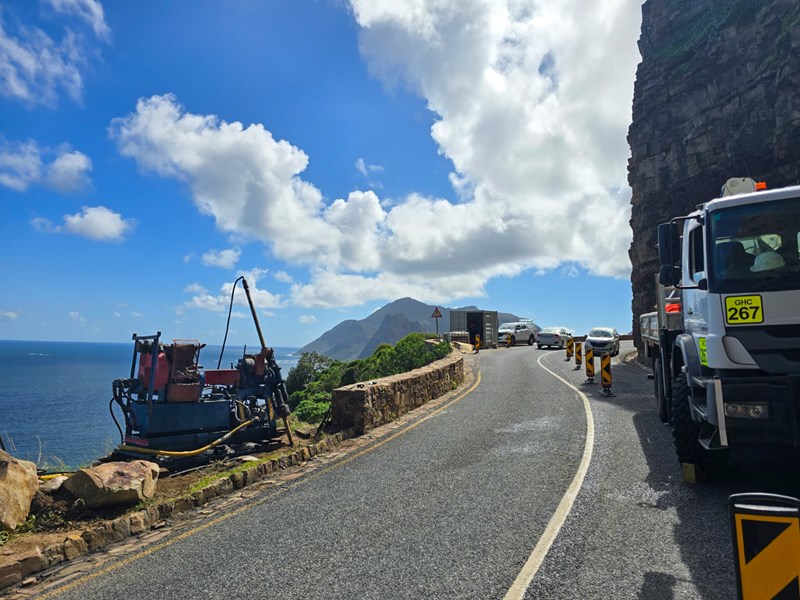Chapman's Peak Geotechnical Investigation

Earlier this year, the Geomech Africa Cape Town team embarked on a challenging project to drill 10 inclined boreholes along the scenic Chapman's Peak Drive in the Western Cape. Each borehole was to be up to 20 meters deep with inclination between 20 -30 degrees.
From the start, the project presented many challenges that Regional Manager Brett Mannix had to overcome. The road's narrowness, heavy traffic, and the need to protect the historical and environmental significance of the area were at the top of the list.
The team's ingenuity and adaptability were instrumental in overcoming these hurdles. To minimize disruptions to road users, a system of lane closures and traffic control needed to be implemented. The project also demanded meticulous planning to ensure minimal impact on the environment and the historical integrity of Chapman's Peak which to date is over 100 years old already with much of the original construction still in place. This being declared a historical site, the team took great care to minimize their impact on the indigenous flora and fauna. They used tarps to line the bottom of each rig to protect the soil from leaks, deployed a crane truck for precise rig positioning, and constructed platforms using sandbags, wooden pallets, planks, and railway sleepers to prevent damage to retaining walls and gullies.
One of the most significant challenges was the inclined nature of the boreholes. To accommodate the limited space between the mountain and cliff sides, the team modified the two drill rigs to a smaller and more manoeuvrable size. As winches and tripods were impractical in the confined spaces, the project required manual labourers to extract the core barrels by hand. At the 3 boreholes, on the seaward side, the crew noticed that the core was very weathered and fractured. To ensure quality core recovery, of over 90%, our team would need to shorten drill runs. This also means that more water would be needed. Due to the pass access constraints, a plan was required on how water was retrieved, how to store it close by, and then how to get the water to the drilling positions. The proposed solution was to have a water truck drive to a nearby toll area, fill up the water truck with non-potable water, deposit the water into a 5000-litre water tank near the layby area, and finally use gravity feed to run the water to the drill locations.
Another factor that proved challenging at times was the weather. Due to the strict safety procedures assigned to the pass, the team were asked to cease work on the pass when weather conditions would become too severe to work. This meant that the team would need to pack up and demobilize to the layby area until it is deemed safe to work. Once the go-ahead was given to resume work, all the equipment and rigs would then be established back to their positions.
A Triumph of Skill and Perseverance
Despite the numerous challenges, the Cape Town team's successful completion of the Chapman's Peak drilling project is a testament to their expertise, dedication, and commitment to environmental stewardship. The project serves as a model for how challenging geotechnical drilling projects can be completed while minimizing environmental impact.
“Thank you to you and your team for successfully completing the exploratory drilling at CPD. You also kept our Environmental Officer happy both during and after drilling. Look forward to working with you and your team again should the opportunity present itself.” - Greg Coelen, Engineering Manager
“Many thanks to you and the GeoGroup team for the great work and effort on the drilling at Chapmans Peak.” – Alexis van der Merwe
Plot 28 Central Road
Sunrella, Lanseria
Gauteng
South Africa
Tel. +27 (0)11 966 7760
Email. info@geogroup.co.za